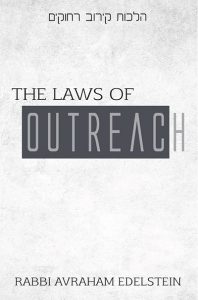
In the previous chapter, we cited the position of many poskim who stated that under extenuating circumstances, the status of tinokos shenishbu can be applied to contemporary non-observant Jews. The implication is that many of the lenient rulings that affect how we relate to non-observant Jews cannot be applied indiscriminately. Rather, to determine whether a situation qualifies for special consideration, it must be evaluated by rabbinic leadership.
In a kiruv situation, the poskim are more lenient, as we will see below. Kiruv situations require different standards for many halachic issues. Moreover, there is an understanding that in many cases, imposing sanctions upon such people (e.g., telling them that they cannot have the honor to be counted toward the minyan until they are observant) is totally counterproductive in our generation.
Please click here to purchase a copy of the Laws of Outreach.
Please refer to the archives below for our previously published chapters of the Laws of Outreach:
Preface to The Laws of Outreach
Chapter I: The Mitzvos of Kiruv
Chapter II: Kiruv as a Rescue Mission
Chapter III: Categories of Transgressors and Our Obligations Toward Them
Chapter IV: Contemporary Non-Observant Jews
_______________________________
OlamiResources.com is honored to present free to the Olami Community and beyond, Rabbi Avraham Edelstein’s new landmark sefer, The Laws of Outreach. We are featuring the sefer to the readership of OlamiResources.com in downloadable installments over the next few months. We are greatly appreciative that Rabbi Edelstein has kindly offered to share this important publication, including extensive Hebrew footnotes, with rabbis, educators and mekarvim worldwide. Please click here to purchase a copy of the Laws of Outreach.



















